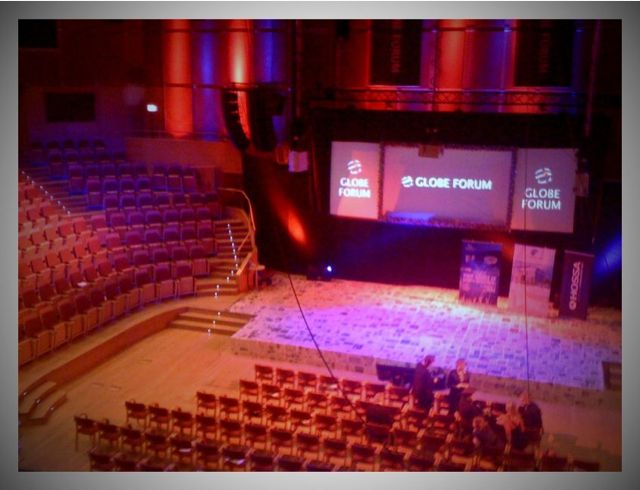Last Wednesday I had the honor to moderate one of the theme sessions at the Globe Forum Innovation Summit in Gdańsk. The government of Gdańsk asked me to take care of the session entitled: “Integration and innovation – a long term prospect for sustainable metropolitan development”. Together with Mr. Alan Aleksandrowicz (CEO of Invest GDA), David Kay (CEO of GE Money Bank Poland) and the audience we had a great discussion in the main concert hall of the beautiful Philharmonic in Gdańsk. The main conclusion is that for Polish local governments there is still a lot to be done if they aim for sustainability, it’s time to act. We have no time to lose.
Article Contents
Setting the boundaries
To set the boundaries of the session, first of all, we shared some definitions. It’s important to define what sustainable means. Many people mostly think about environmental aspects, but sustainable city development means a lot more. In our opinion sustainable integration should include historical, social, economic, environmental and cultural aspects to make an innovation successful. See the presentation below for more information.
[slideshare id=2397973&doc=20091028globeforumgdanskthemesessioninnovationandintegration-091101155455-phpapp02]
Local governments have a responsible role
During the morning session one of the main conclusions was that in the upcoming 30 years about $ 250 Trillion will be invested in the urban development worldwide. Knowing the issues we are facing, these investments should be sustainable. Local governments should take the lead here. They should be the early adopters of new innovations. This is the only way to make these innovations become successful. A business owner can only continue the development of a good ideas if he has a significant turnover. Therefore local governments have the responsibility to stimulate innovation and adopt it as soon as possible.
How to become a sustainable city?
First of all, Mr. Aleksandrowicz mentioned that in his opinion the development in Gdańsk hasn’t been sustainable so far. He shared several big projects that are under construction or planned in Gdańsk. Together with the audience we discussed them. Bullet wise I will present some of the main conclusions:
- Polish governments tend to point to the fact that they are legging behind compared to Western Europe due to the Communistic times. Of course this is fact, but it is high time to stop grieving over it. It’s time to act. Besides Polish local governments today have the opportunity to learn from all the mistakes others (in Western Europe) already made, to prevent repeating them once again. But this will require an attitude change.
- The current policies are very event and opportunity driven. A master plan with a clear philosophy how to develop the city is clearly lacking. Decisions are made mainly driven by economic reasons. Local governments are very much focused on attracting new investors to locate themselves in their city. They aim to sell as many available lots at most competitive prices possible. Together we concluded that this mainly focusing on the short term results, on quick gain. What happens next?
- To become sustainable cities local governments will have to lead by example and be more in control. They should force their (foreign) investors to use (local) innovations to make their investment integrate with the city in a sustainable way. It’s naive to think investors will do this themselves.
- Too often metropolitan plan is lacking. Take for example Trójmiasto (TriCity: Gdańsk, Sopot and Gdynia) which are too often competing instead of joining their efforts. The presented initiatives are all nice projects in Gdańsk and for sure in many cases the whole region can profit from them, but how they fit the metropolitan plan is not clear.
How green power can support sustainable metropolitan development
In a relatively big country like Poland big cities heavily influence the whole region. This makes the rural area very depending on the decisions made far away from them. Mr. Kay presented one of the GE Commitments, ecomagination. Since 2005, ecomagination has been GE’s commitment to use imagination to set the standard for environmental performance. In 2020 GE plans to have installed 2000 biogas installations in rural areas. This installation generate green power and clean (hot) water from local agricultural/bio waste.
These installations make the rural area self-sufficient and if successful it can even create a distributed power production network for the whole region, meanwhile reducing current environmental problems.
- We concluded local governments should support farmers and local communities to consider such bio gas installations. These are too complicated projects to be handled by them on their own.
- Financial support is being offered among others by GE Money Bank, but should be offered by others as well in a more structured way.
- Companies should take their responsibility to support the sustainable development of the city and the metropolitan area.
Thanks to the interaction between panel and audience the session took longer than originally planned. It also showed that among inhabitants of Trójmiasto there is a big need for more information. They used this theme session to exchange their concerns. The local and regional governments should listen to these concerns and communicate their ideas and plans in a better way.
Besides the local governments have to be aware of the things mentioned above. Let’s prevent the scenario that in about 30 years time we realize that we didn’t use the available opportunities and resources in the best way. It’s time to choose and we have to choose today!
Please share your opinion, concerns, questions, ideas, etc. below. We would love to discuss them and if needed I will forward them to the appropriate person/institution.

